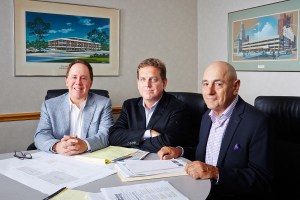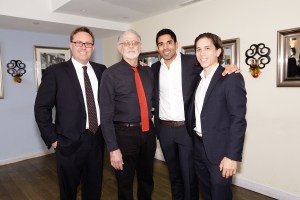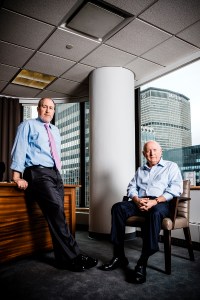Little Guys, Big Bucks: Three of New York City’s Top Boutique Finance Firms
By Danielle Balbi and Cathy Cunningham July 20, 2016 9:45 am
reprints
It doesn’t take backing from a big firm to be a good negotiator, and that’s something any of these three boutique financial brokerages that Commercial Observer spoke with can tell you.
From arranging debt on airport hangers to catering to New York City’s most elite real estate families, these firms can do it all (and with less than 10 brokers!). Their transaction sizes run the gamut too, from as small as $1 million to the hundreds of millions. And while they all have their own quirks and personalities, the one thing they can all agree on is that having a small team does wonders for maintaining relationships not only with their clients but amongst themselves.

Yvonne Albinowski/for Commercial Observer).
Altman Warwick
Founders: Robert Altman and Brian Warwick
Date established: 2005
Number of brokers/agents then: 4
Number of brokers/agents now: 5 (plus 1 employee)
Former bankers Robert Altman and Brian Warwick began working together in 1997, before starting their boutique financial brokerage in 2005. They have worked on virtually every type of financing since—from straight multifamily debt to ultra-luxury retail centers to term loans secured by airplane hangars. The firm’s principals attribute their success to a combination of how the team manages deals, the trust and credibility that they have earned over the years in the marketplace from both lenders and owners, and the quality of their client base. “We take a very thoughtful and disciplined approach to the way we market our deals,” Altman said.
Including the brokerage’s two principals, the Long Island-based firm has a total of six people, including two originators, a closer and administrative person and a sales trainee. Next on the agenda is the opening of a New York City office, which will be staffed with four people initially.
“Although we are lean, we are very productive,” Altman said. “Over the past decade, with the exception of 2009, our volume has averaged over half a billion a year. Last year we closed $700 million in financing. We have also seen our average deal size grow dramatically—we just rate locked our second nine-figure deal this year.”
Altman Warwick has made a name for itself by arranging financing for some of the “best-in-class” owners and trophy properties on Long Island, such as The Americana Manhasset and $92 million Bay Terrace Shopping Center located in Bayside, Queens, the former containing one of the highest suburban concentrations of ultra-luxury retailers in the Northeast.
“On the other end of the retail spectrum, last year we closed a $169 million blanket mortgage secured by 25 strip shopping centers located in secondary and tertiary, lower-income, demographic markets throughout the Southeast,” said Warwick, adding that closing the loan was a massive undertaking. “We performed lease reviews on 350 tenants and reviewed and negotiated 75 third-party reports, and we were still able to close inside of two months, while managing the closings of five other transactions during that time period.” Although Altman Warwick does most of its business with portfolio lenders, this loan was closed with a commercial mortgage-backed securities lender due to the size, asset quality and high loan-to-value requirement of the deal.
Retail has always been a strong specialty, thanks in large part to the addition of Gerry Krell, who joined as the director of originations in 2005, said Altman. “We closed a $56 million loan on a Class A multifamily complex in Jupiter, Fla., and we are in the process of closing a $100 million office building in Manhattan. Both deals are being done by a major life insurance company. On the construction loan side, we arranged a $140 million loan for the development of a 530,000-square-foot, state-of-the-art biotech office building in New Haven, Conn., which was recently completed.
“I think boutique firms like us are able to able to offer a consistently higher level of personal service,” Altman said. “When you do less deals, but those deals get done by highly experienced principals instead of associates—there is a greater level of expertise, which generally results in smoother execution and a better borrower experience.”

Founders: John Harrington, Ayush Kapahi, Jerry Swartz
Date established: 2011
Number of brokers/agents then: 3
Number of brokers/agents now: 9 originating brokers (plus a support staff of 10)
HKS Capital Partners is busy. In addition to closing $40 million and $50 million deals as Commercial Observer was interviewing Principal Ayush Kapahi, the firm was in the process of signing up a $150 million construction loan. For Kapahi, the company’s success comes down to three key strengths—service, management and execution.
All three of the company’s founding partners came out of Pergolis & Swartz. “The ‘H’ is for Harrington, the ‘K ‘is for Kapahi and the ‘S’ is for Swartz,” Kapahi explained. “We started with the three of us and grew the company from there.” Today, HKS also has a fourth partner, Michael Lee.
The HKS platform serves deals as small as $1 million, assigned to newer brokers, to transactions as large as $250 million, and led by the brokers who have been at the boutique longer and subsequently have the ability to pull off larger deals.
“We’re deal junkies,” Kapahi said. “We love any and every deal. It obviously revolves around what our clients are pursuing and most importantly what the banks are willing to finance—we’re intermediaries, and we can only source and tie up capital that is third party. The gamut has grown dramatically with different institutions and funds entering the market, which always makes it exciting, but there isn’t a specific type of asset class or deal that we love. We love everything!”
Although around 60 percent of HKS’ business is in the tri-state area, the brokerage is active nationwide, having closed a multifamily acquisition in Florida on July 11 and currently funding several other deals in Pennsylvania, Las Vegas and California. Over the last five years, HKS has expanded its business as its clients have expanded their footprint nationwide.
The beauty in being a boutique brokerage is that the company and platform are manageable, Kapahi said. “We’re not taking on brokers who don’t carry and produce on their own—we run a very efficient and tight shop,” he said. That efficiency includes personalized service and clients having access to the firm’s three partners in every transaction.
The biggest eye-opener in 2016 for Kapahi has been dealing with the changes in the construction loan market and the land loan market. The firm currently has more than $400 million in those types of deals signed up with financial institutions, but “[the markets have] become more selective,” Kapahi said. “It has helped our position tremendously, in that who is ‘out there’ has shrunk tremendously and the art of actually brokering these transactions has kicked in, in making sure that the lender is comfortable and making sure that the borrower understands how the world has changed and how they need to make the lender comfortable. We have a very good repertoire of institutions that trust us and trust our ability to deliver them good core product that they believe they won’t get hurt on.”

The Singer & Bassuk Organization
Founders: Andrew Singer and Richard Bassuk
Date established: 1996
Number of brokers/agents then: 3
Number of brokers/agents now: 2 (plus 4 origination professionals/analysts and 4 support staff)
Some people like to keep things small, and some people like to keep them in the family—something The Singer & Bassuk Organization, headed by father-and-son team Andrew (Andy) and Scott Singer, has been doing for a long time.
Andy started his career in the real estate business in 1968 at Ackman Brothers, a predecessor firm run by his two uncles. His son Scott actually began working there (once it became Ackman Brothers & Singer) during his summers in college in the early 1990s, and in 1996, Andy founded Singer & Bassuk in its current form (with Richard Bassuk, who later left to form Greystone Bassuk).
Now, the father and son are the only two debt originators in the company and have two client-focused managing directors, Kathleen McSharry and Jeffrey Moroch, and two analysts. McSharry has been working with Andy since 1982, while Moroch joined Singer & Bassuk in 1999.
“A small team who has that level of knowledge, experience and shared history together has created the ethos that has made us very appealing, specifically to the multigenerational families of New York real estate,” Scott said. Indeed, Singer & Bassuk’s client base is largely comprised of those New York-based, family-run real estate firms, including Jack Resnick & Sons, Kalmon Dolgin Affiliates, Muss Development, Rockrose, Ruben Companies, TF Cornerstone, Winter Organization and World Wide Group. (In the last decade, Andy has completed more than $15 billion in debt originations in Manhattan alone, and Scott has done several billion as well.)
Very recently, the debt intermediary closed four deals totaling more than $550 million for its clients, Scott said. One of those was $50 million in acquisition financing arranged on behalf of World Wide Group, run by the Elmaleh and Stanton families, for SkyHouse, a 320-unit rental building in Raleigh, N.C., as well as a $32 million loan for the buy of 42-15 Crescent Street in Long Island City.
And Singer & Bassuk is currently in the market with more than $1 billion in financing, including two roughly $300 million deals and one $200 million transaction.
Andy and Scott embrace being a “boutique” with a small, close-knit team and have never been tempted to expand the firm’s reach into sales or leasing. “I think that clarity of purpose and strict avoidance of conflicts is something that appeals to major, private, sophisticated owners in New York and differentiates us from the vast majority of other firms who are active in finance [here],” Scott said. “Those other models work, but there’s a lot of competition from the much larger institutional, multiservice world now, and quite frankly, we see very few, if any others, who are set up the way that we are.”



